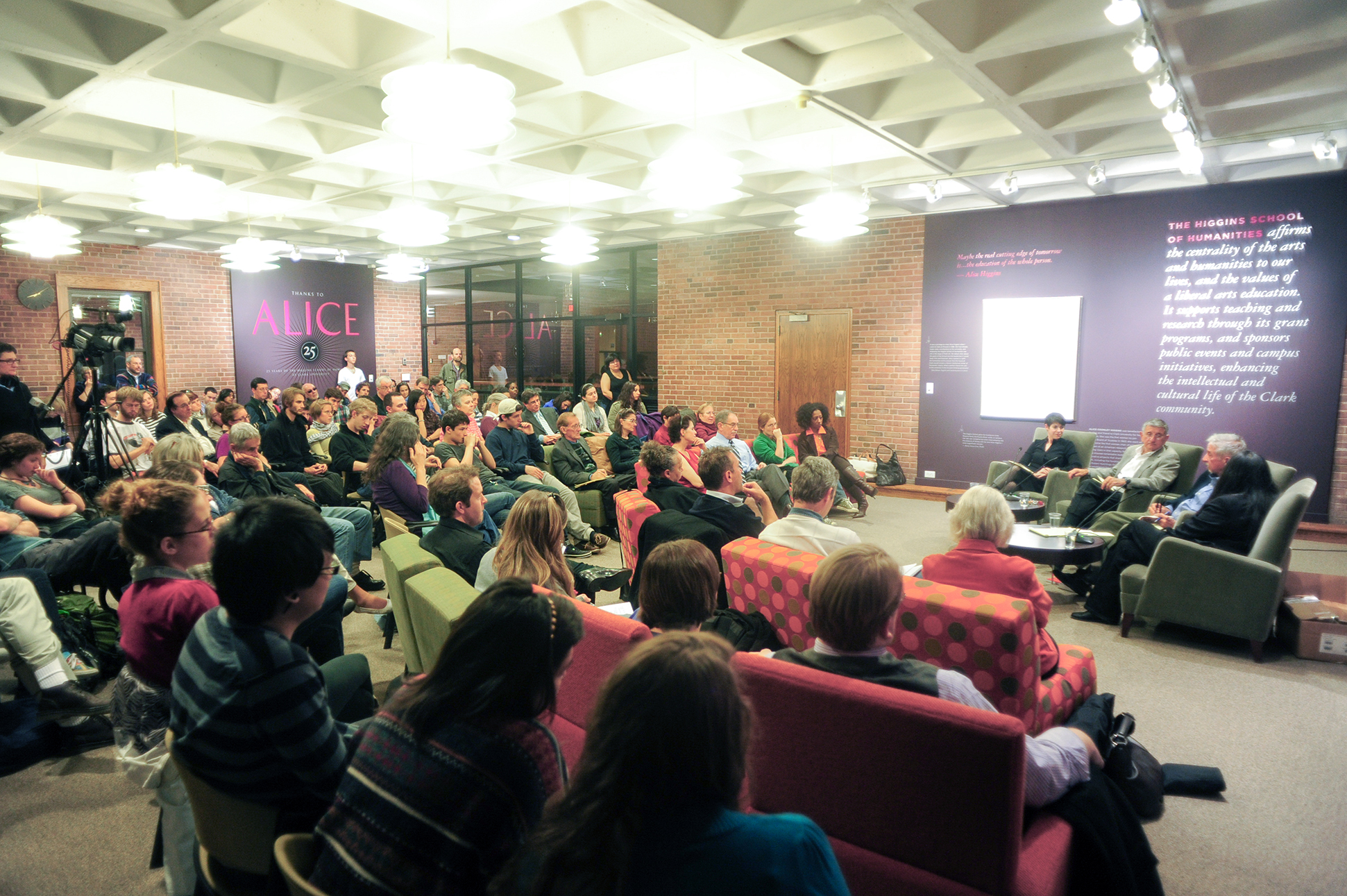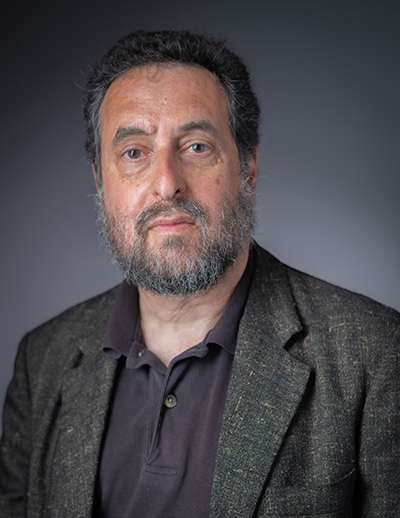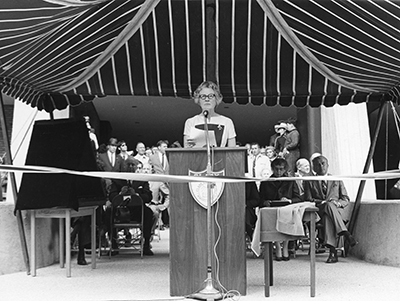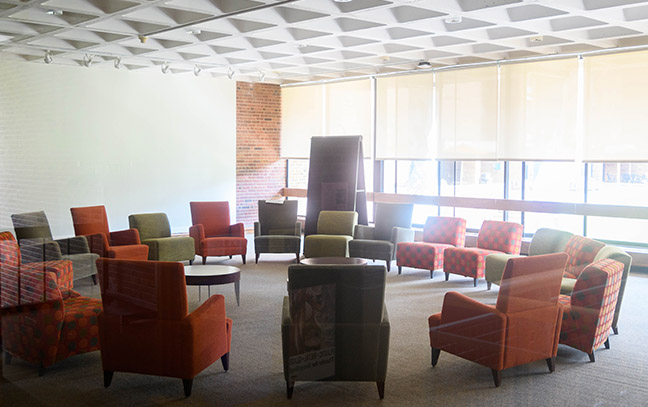‘We need many different voices’

In 1986, former longtime Clark trustee Alice Higgins made a $1 million gift to establish the Higgins School of Humanities — a channel for developing innovative programs, supporting compelling faculty research, and generating the kinds of conversations that bridge disciplines and encourage the expression of wide-ranging — sometimes conflicting — perspectives.
Thanks to this singular gift and the vision of its directors and staff over the decades, the school thrived, and it will continue to flourish under its new name: the Alice Coonley Higgins Institute for Arts and Humanities.
“With this renaming, we acknowledge and reaffirm our mission: to uphold the centrality of the arts and humanities in our lives and to promote the intrinsic values of inquiry and education,” Director Matt Malsky says. “The Higgins Institute promises to amplify the call of our community to support all aspects of humanistic endeavors: scholarship, artistic expression, fellowship, collaboration, teaching, and learning across Clark’s campus and beyond.

“I think that the Higgins Institute can be described as bringing the world to Clark, with empathy,” he adds. “Everything is done with humanity at the forefront. Not just humanities, but humanity.
This fall, the Higgins Institute will begin work on a new four-year project with substantial support from the Sherman Fairchild Foundation and in close partnership with the Becker School of Design & Technology and the Department of Visual and Performing Arts. Higgins-backed initiatives will explore how traditional humanities can mesh with digital technologies to enhance research capabilities and bring fresh academic approaches to a generation of students who are native to the digital universe.
Among the goals of this research collaborative are to incorporate these technologies into cross-disciplinary arts curricula and make them more accessible for all students in their creative work and scholarship. The program is expected to foster collaborations among the arts disciplines as well as between the arts and other areas of study.
“You reach a critical mass when you figure out what the community needs and what is useful to people — and you create programming that you hope will resonate with them,” Malsky says. “We are a liberal arts school, but part of the liberal arts will have to be about embracing technology that is in service to the liberal arts and reflects the multiple ways that people experience humanistic subjects.”
Environmental humanities, a mainstay in the Higgins Institute, have taken on even greater urgency as Clark prepares to open its School of Climate, Environment, and Society in the fall of 2025. In 2022, the then-Higgins School held a Symposium on the Environmental Humanities. And last semester, Higgins and A New Earth Conversation announced four faculty fellows — in English, geography, history, and languages — who will develop courses for next spring that will explore climate challenges from a humanities/humanistic perspective.
The Institute will bring a renewed focus to “public humanities” by fostering collaborations with external partners that will offer opportunities for the community to probe complex and pressing issues. Last year, in Dana Commons, the Higgins Institute hosted the Worcester premiere of filmmaker Jennifer Potts’s original documentary, “If You Become My Friend,” chronicling Afghan refugees who are making new lives for themselves in the city. Family members, friends, Worcester officials, and students from local schools gathered to watch the film — which was translated into four different languages in real time — and then engaged in a wide-ranging conversation about what they’d just seen and discussed their hopes and plans for the future.
The screening underscored the Higgins Institute’s emphasis on public humanities, which, as Malsky puts it, “we’re bringing to the masses.
“We’re looking to build communities of practice,” he says. “And to do that, we need many different voices.”
Another research collaborative, Early Modernists Unite, connects scholars of medieval and early modern Europe and America and offers a public lecture series, “Roots of Everything,” that links historical insights to contemporary issues.

All of this robust work can be traced back to the original gift made by Alice Higgins, a consequential figure in Clark’s history who passed away in 2000. The longtime leader and benefactor, known for a dynamism that matched her generosity, has her name fixed in University lore. In 1962, she became the first woman elected to the Board of Trustees, and from 1967 to 1974 served as the first female chair of a board of trustees at an American research university. She was instrumental in planning and fundraising for signature University structures, like the Goddard Library and Kneller Athletic Center — photos of Alice breaking ground on a construction site are an indelible piece of the Clark canon.
Others remember her kneeling in the soil outside Clark buildings, planting tulips and geraniums to add colorful accents to campus.
“We’re at the tail end of a moment when people who actually knew Alice are still on campus, and I think it’s important that we keep her front and center,” Malsky says. This fall, the Higgins Institute will pay tribute to Alice with an exhibition in the Higgins Lounge that features her own writings on Clark, on education more broadly, and on the pleasures of traveling.
Further festivities will include a screening of Music Professor John Aylward’s new filmed opera, “Oblivion,” and lunchtime book talks with English professors Mandy Gutmann-Gonzalez and Elizabeth Blake. The Higgins Institute is also piloting two new grant opportunities: a student fellowship program and a competitive seed grant to support a new faculty research initiative or creative project in the arts or humanities.
“We hope to see everyone in the Clark community often this fall as we begin the next chapter of the Higgins Institute,” Malsky says. “We move forward with gratitude for the intellectualism, creativity, and collegiality that continue to thrive at Clark — and, as always, with deepest thanks to Alice.”



